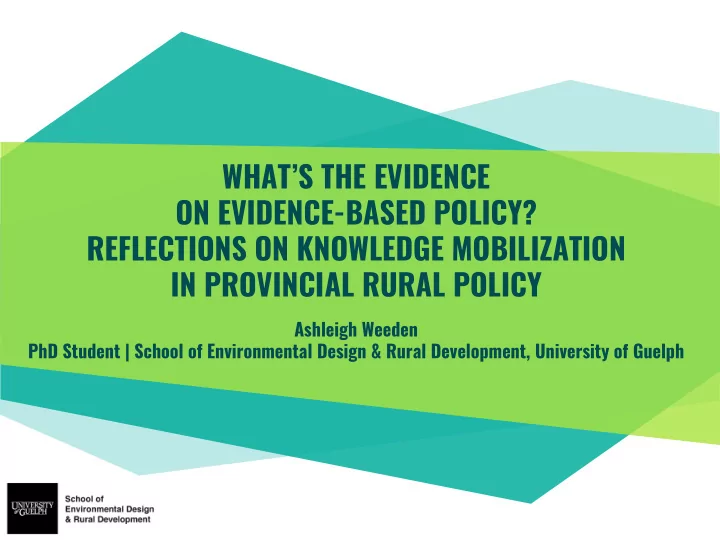

WHAT’S THE EVIDENCE ON EVIDENCE-BASED POLICY? REFLECTIONS ON KNOWLEDGE MOBILIZATION IN PROVINCIAL RURAL POLICY Ashleigh Weeden PhD Student | School of Environmental Design & Rural Development, University of Guelph
HOW WE STUDY POLICY…. ...AND HOW IT ACTUALLY GETS MADE Public policy = anything governments do or do not do ● (Reimer & Bollman, 2009) ● Policy analysis can be for policy or of policy and seeks to provide alternative choices for policy makers (Colebatch, 2016; GIll & Saunders, 1992) Relatively recent endeavour, stemming from large-scale ● planning & public financial management of 1960s (Gill & Saunders, 1992) Often focused on macro-level processes that don’t capture the ● micro-level human activities that underpin the mechanics of policy formation (Dunlop & Radaelli, 2017) ● We tend to focus on the engine and not on the mechanics that maintain it
WHAT’S THE EVIDENCE ON EVIDENCE-BASED POLICY? Policy making neither begins nor ends with seemingly ● straightforward decisions about allocating resources: policy choices in the face of competing needs, goals & aspirations influences both the means and the ends of the policy process (Atkinson & Chandler, 1983) Very few studies that assess the practical importance of ● influence of what enables or creates barriers to knowledge mobilization in public policy (Oliver et al., 2014) Collectively, we’re often fuzzy on what we mean by policy, ● evidence, policy-makers, policy-making, and the specific mechanics of a given policy cycle at each jurisdiction
You keep using that word. I do not think it means what you think it means. - Inigo Montoya
INFORMATION DATA KNOWLEDGE
Everybody wants to be the first to go second.
WHAT DOES THIS MEAN FOR CANADIAN PROVINCIAL RURAL POLICY? Interviewed policy makers from Ontario, Prince Edward Island, ● and Newfoundland and Labrador ● Interviewees included former senior policy makers, junior policy analysts, and policy advocates external to government Five key challenges identified to effectively using research ● evidence: ○ Difficulty accessing research evidence ○ Ineffective knowledge translation tools Misalignment of academic research with policy needs ○ Slow research cycle versus fast policy cycle ○ ○ Lack of political will to implement research findings
RECONSIDERING EVIDENCE-BASED RURAL POLICY Interviews reinforce broader literature findings that: “ timely ● access to good quality and relevant research evidence, collaborations with policymakers and relationship- and skills-building with policymakers are reported to be the most important factors in influencing the use of evidence.” (Oliver et al., 2014) Evidence-based policy analysis seeks to avoid or limit policy ● failures generated from disconnects between government expectations and actual conditions in communities However: movement to incorporate more and better evidence ● in the policy process hasn’t effectively altered the policy cycle (Newman, 2017; Newman, Cherney, & Head, 2017) Need to develop clarity & consistency in terms of what ● constitutes evidence and matching program goals with policy instruments
We’re not going to save the world by email, you really have to come over and say “hello.” - Robert Swan
QUESTIONS? LEARN MORE AT WWW.RURALDEV.CA/MAKING-A-DIFFERENCE OR CONTACT ASHLEIGH WEEDEN WEEDENS@UOGUELPH.CA @ASHLEIGHWEEDEN This project is funded by the Ontario Ministry of Agriculture, Food and Rural Affairs through the Ontario Agri-Food Innovation Alliance
REFERENCES & RESOURCES Atkinson, M. M., & Chandler, M. A. (1983). The Politics of Canadian Public Policy. Toronto: University of Toronto Press. Colebatch, H. K. (2015). Knowledge, Policy and the Work of Governing, 17(3), 209–214. Dunlop, C. A., & Radaelli, C. M. (2017). Learning in the bath-tub: The micro and macro dimensions of the causal relationship between learning and policy change. Policy and Society, 36(2), 304–319. Fonesca, L. (2019, March 13). Third mission accomplished? Why are universities bad at engaging with local and regional government and what we can do about it. https://blogs.lse.ac.uk/impactofsocialsciences/2019/03/13/third-mission-accomplished-why- are-universities-bad-at-engaging-with-local-and-regional-government-and-what-we-can-do-ab out-it/ Gill, J. I., & Saunders, L. (1992). Toward a definition of policy analysis. New Directions for Institutional Research, (76), 5–13. Newman, J. (2017). Deconstructing the debate over evidence-based policy. Critical Policy Studies, 11(2), 211–226. Newman, J., Cherney, A., & Head, B. W. (2017). Policy capacity and evidence-based policy in the public service. Public Management Review, 19(2), 157–174. Oliver, K., Innvar, S., Lorenc, T., Woodman, J., & Thomas, J. (2014). A systematic review of barriers to and facilitators of the use of evidence by policymakers. BMC Health Services Research, 14(1), 1–12. Reimer, B., & Bollman, R. D. (2009). Understanding Rural Canaa: Implications for Rural Development Policy and Rural Planning Policy. In D. J. A. Douglas (Ed.), 2. Guelph: Nelson Education.
Recommend
More recommend